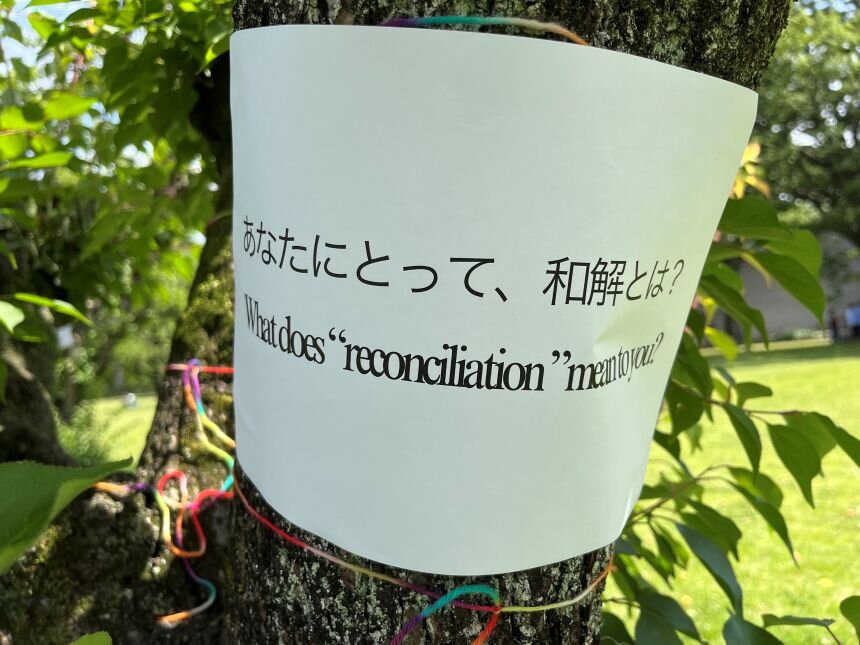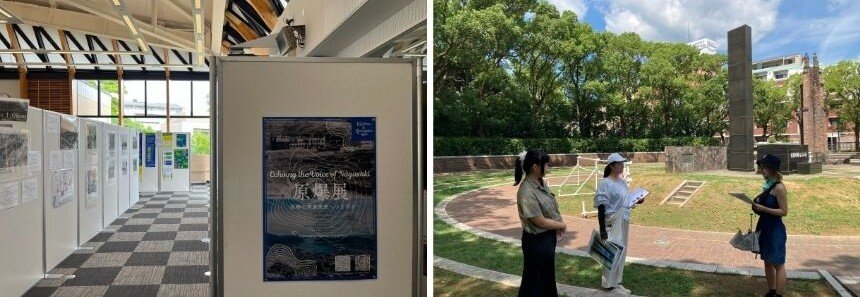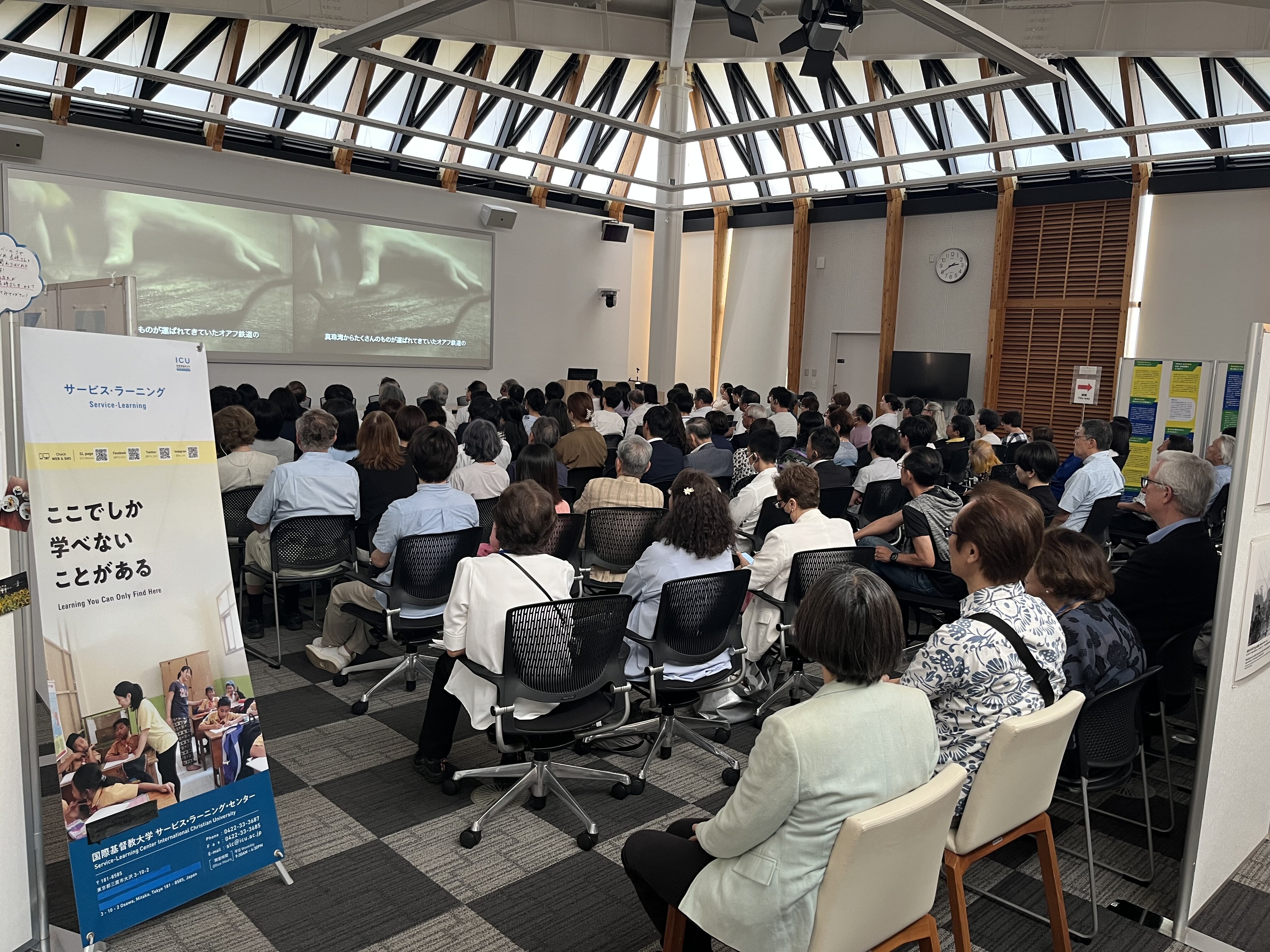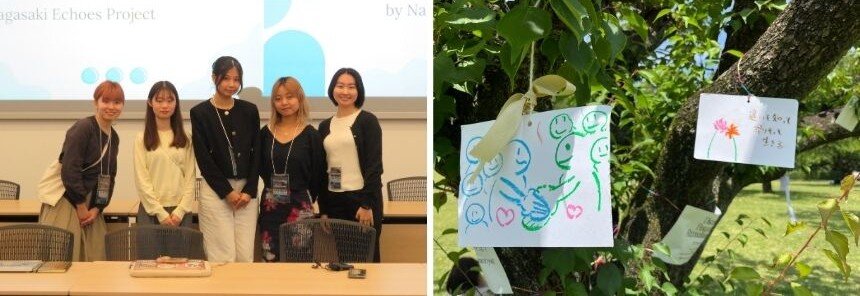NEWS
ICU Peace & Reconciliation Week was Held
Update: July 18, 2025

From Monday, June 2 to Sunday, June 8, 2025, the first-ever Peace & Reconciliation Week (P&R Week) was held at ICU. A wide variety of programs—including lectures, workshops, film screenings, and an atomic bomb exhibit—were held across the campus throughout the week, with deep dedication to peace and reconciliation from students and faculty. More than 400 attendees from both inside and outside the university participated. In this milestone year, marking 80 years since the end of World War II, the week provided an opportunity for people to reflect on 'peace' and 'reconciliation' from their own perspectives.
P&R Week from the Perspective of Service-Learning Programs

Peace & Reconciliation Week was organized by the student group, ICU Reconciliation Forum, with support from faculty and staff members at ICU and Middlebury College. The initial drive for the involvement of Service-Learning (SL) coordinators came when students who had participated in Community SL in Nagasaki applied for Middlebury College's "Projects for Peace" grant*1. Immediately after the community service ended, the students expressed their desire, not to let their experiences and encounters in Nagasaki end there, but to build on them for the future. When we heard about this grant opportunity this Spring, we felt it was a perfect chance to realize their vision, so we introduced them to the program. Fortunately, the students' proposal was accepted, and we were able to secure a grant of a scale rarely seen in Japan.
The student team took the question of "how to use the funds provided", not as a mere operational issue, but as an ethical challenge of how to realize their vision for peacebuilding, and they approached it with sincerity. In early May, they organized a lecture by a hibakusha survivor and a talk by an expert in an English-taught peace studies class. During the Week in June, they held an atomic bomb exhibition and talk sessions, sharing experiences and learning with a diverse group of people from inside and outside the University, and engaging in discussions about the future. Through these activities, the students demonstrated their commitment to peace, and I felt that the sense of responsibility and mission among the students of the post-war generation was growing stronger.
It was also important that faculty and staff members supported the students and worked together to realize their ideas and aspirations. Personally, I found it very rewarding to share a different side of the students and ourselves that we do not see/show in the classroom or on campus. Such activities are educational practices that embody the liberal arts education philosophy of ICU and can be positioned as "co-curricular" (non-credit) educational activities in the field of higher education. P&R Week, based on the ideals of peace and reconciliation, created a space for dialogue on campus through the words and actions of young people, creating irreplaceable encounters and learning opportunities for all involved.
I am convinced that this new initiative has once again demonstrated the potential of liberal arts education to the ICU community. I am truly grateful for the opportunity to work together as equal collaborators with students, faculty, and the local community, and I sincerely hope that these initiatives will be utilized and further developed in future education and research. (Atsuko Kuronuma, Assistant Professor by Special Appointment, Service-Learning Center)
P&R Week from the Perspective of Middlebury College and ICU

Middlebury's School in Japan, located on the ICU campus, and the ICU International Office are deepening their relationship beyond student exchange programs. It was impressive that P&R Week provided a unique opportunity to celebrate the 15th anniversary of the partnership between ICU and Middlebury College.
On Saturday, June 7, two documentary films related to World War II were screened. Both films were made possible through the involvement of students from ICU and Middlebury College. "The History of Tenryu Village", a documentary that sheds light on the past when many non-Japanese prisoners of war and people forcibly mobilized from China and South Korea were engaged in dam construction in Tenryu Village, Nagano Prefecture during the war, was produced by Middlebury College students studying abroad at ICU.
Likewise, "Removed by Force" is a film depicting the activities of William Kaneko (past president of the Honolulu JACL Chapter) and Clayton Ikei, the chapter's legal counsel who stood up to correct the history of persecution and human rights violations against Japanese Americans in Hawaii. The student historical translation group, "ICU Time Travelers," comprised of students from ICU and Middlebury, produced Japanese subtitles for the film. On the day of the screening, Mr. Kaneko himself and filmmaker Ryan Kawamoto, who directed the film, took the stage.
In addition, the Kiyoshi Togasaki Memorial Dialogue House International Conference Room, where the screening took place, hosted an exhibition on the atomic bombing of Nagasaki entitled "Thinking about the Future from Nagasaki" prepared by the winners of an award from Middlebury College's "Projects for Peace" program. More than 100 people who came to see the documentary stopped by to view the panel exhibition.
It was a powerful opportunity to see how students are turning their strong desire for peace into action and working to build a peaceful future in their own unique ways. (Sanae Eda, Director, Middlebury's School in Japan)
P&R Week from a Student's Perspective

Three students who participated in the Nagasaki Service-Learning program teamed up with three students originally from Nagasaki and formed a group of six students to launch the "Nagasaki Echoes Project" this April. During this year's P&R Week, we held an atomic bomb exhibition and organized a student event on the first day of the exhibition to share our thoughts on the project, our individual experiences of Nagasaki, and our perspectives on nuclear weapons.
During the exhibition, many ICU community members as well as many people from outside the campus visited, and we were able to think about Nagasaki together and exchange opinions while viewing the exhibition. Having the opportunity to think about the realization of a peaceful world with people from different backgrounds and perspectives at the ICU was a very educational and inspiring experience for us as project members. We would like to continue to engage with Nagasaki, Japan, and the world, and do what we can to contribute to the realization of a peaceful world.
(Ririko Shishino, Politics Major)
ICU was established after World War II through the prayers for peace of people around the world. In fact, many students at ICU are interested in the concept of "peace," but when it comes to concrete approaches to peace, it is also a reality that it feels somewhat distant for us who live in Japanese society. This tendency can also be seen at ICU in activities related to peace.
Through Peace and Reconciliation Week, which was a first attempt, we were able to take practical steps toward addressing this issue, and the joy we felt was immeasurable. Working together with many participants to face the challenges of "peace" and "reconciliation," learning, and sharing our thoughts was a valuable experience unique to ICU.
Finally, I would like to touch on the Christian aspect of ICU, which is based on the gospel. Christians are people who always seek reconciliation with God. They recognize their sins, ask for forgiveness, and engage in dialogue with God. According to Dr Chris Rice, the co-founder of Duke University's Reconciliation Center, who has been invited to ICU a few times as a speaker, Christians are constantly on a journey called "reconciliation." The concept of reconciliation is very important in Christianity. As a Christian myself, I am truly grateful for the opportunity to think about peace and reconciliation with my friends on the gospel-filled campus of ICU. I would like to express my sincere gratitude to my fellow organizers, participants, everyone involved, and the Peace Research Institute. I would also like to offer my deepest gratitude to God for guiding us through this experience, and I will continue to pray for the realization of peace in the future.
(Kosei Sato, Peace Studies Major)
*1 Middlebury Projects for Peace
Projects for Peace is a global program that partners with educational institutions to identify and support young peacebuilders. Each year, the program grants $1.25 million to student leaders at eligible partner institutions who are developing innovative, community-centered, and scalable responses to the world's most pressing issues.
Reference --- P&R Week: https://www.icu.ac.jp/events/PeaceReconciliationWeek_2025.html
